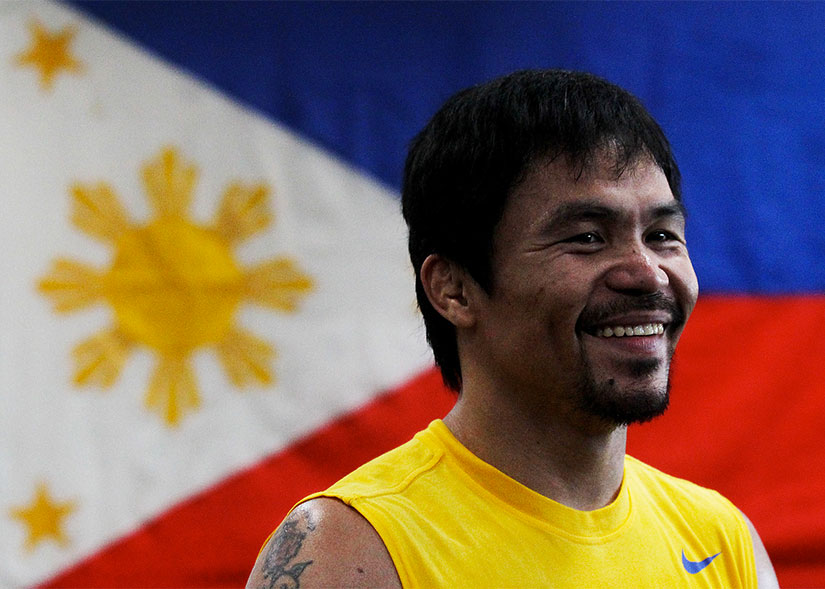Guest editorial by Jordan Garcia.
The question any Filipino gets asked when a Pacquiao fight is looming near is, “Where are you watching the fight?” It’s never “Are you watching the fight?” It’s a universally understood truth that we watch his fights. We don’t have to know anything about boxing. We don’t even have to know who he’s fighting. All we need is the time and place, and we cheer like hell. It doesn’t even matter that he’s hundreds — sometimes thousands — of miles away, everyone has that one Auntie that yells as if he can hear her. Nothing brings my multi-generational Filipino family together quite like a Pacquiao fight.
The way in which we celebrate each fight is rooted in the Filipino culture of hospitality. We open up our homes to anyone who needs a place to watch it. We bring enough food to feed a small army and force everyone to “eat, eat.” And of course, there is no shortage of laughing as loud as humanly possible, most of the time at things that aren’t even funny. These are all things that Philippine-born and American-born Filipinos can relate to even when they can’t relate to each other. But the deeper connection with Pacquiao is the sense of pride that we feel knowing that he is “one of us.”
Many times growing up, I’d be shopping with my grandmother, and we’d run into a complete stranger who happened to be Filipino. It took me years before I actually realized that these people weren’t part of my extended family. I always assumed that we were related because of the ease my grandma would talk to them. The conversations were long, and if that stranger happened to work at wherever we were shopping, it would end with the request of a “Filipino discount” and a light chuckle. This is how I learned you should never be shocked what one Filipino will do for another. If family was measured by what you would do for someone, these strangers would be considered family.
It wasn’t until the first time I heard someone say that Filipinos are “so ridiculous” because of the way we cheer for Pac Man that I realized why Manny being a stranger in my family was so important. I’ve heard this comment a few times since then, and when I glance over, it’s always some “American” (and by “American,” I of course mean white person) I’ve laughed to myself each time. When you don’t understand what it’s like to be marginalized as a group, you aren’t forced to have pride the way that we are.
If you’re a person that read that last sentence and thought to yourself, “Marginalized is too strong a word,” allow me to educate you.
Are you aware that there was a Philippine-American war that ended with the US occupation of the country as a territory? Many historians say this drastically changed the cultural landscape of The Philippines. Did you know that Filipinos are the third largest immigrant group in the United States behind Mexicans and Chinese? Knowing that, can you relate Filipinos to anything besides Manny? Marginalized, by definition, is to treat as insignificant or peripheral. Not just Filipinos, but Asian-Americans as a whole are treated as insignificant in this country. That is why Manny being “one of us” is so important. He is the hero that brings us into significance. He makes The Philippines and its culture a focal point.
The greatest part, for me as a Filipina, is knowing that Manny is just like those Filipino strangers at the market. Manny is so excited for his upcoming fight against Mayweather that he wrote a song about it, “Lalaban Ako Para Si Filipino” in English that translates to “I Will Fight for the Filipino.” That’s what Manny would do for us. He fights for us for the same reason we cheer for him. We’re proud of who we are and we’re fighting for our significance.

